by Jim Brummett | Mar 31, 2020 | Devotions
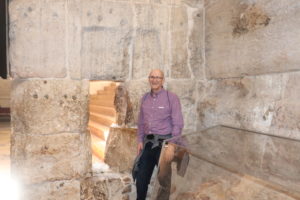
Mark 10:25 It is easier for a camel to go through the eye of a needle than for a rich man to enter the kingdom of God.
The imagery of this verse was made real to me in our recent trip to Israel. The “eye of a needle” was a small opening at a city gate and measured approximately 3 feet high and 18 inches wide. Entering through the eye was a tight squeeze for an adult and an impossibility for a large animal like a camel.
This teaching moment is brought to you by a rich young man who asked Jesus what was necessary for him to receive eternal life (Mark 10:17). Jesus told him to honor the moral principles of the Mosaic Law through his actions and attitudes. Then in a serious test of the young man’s values, the Lord instructed him to “sell what you have and give to the poor, and you will have treasure in heaven; and come, follow me” (V.21). Verse 22 states the young man “went away sorrowful, for he had great possession.”
It is worth noting that Jesus didn’t challenge the man’s commitment to God. Look at verses 19-20 and you will see he had check all the right boxes in regards to spiritual disciplines. Don’t commit adultery – check. Don’t murder – check. Don’t steal – check. Don’t bear false witness – check. Don’t defraud – check. Honor your father and mother – check. The man was deeply religious.
It is also worth noting that Jesus did not condemn the man for his wealth. Wealth is not sinful, for it can be used to spread the gospel and provide assistance for people in need. The problem wasn’t the man’s wealth, but the value he placed on it. Jesus wanted to see what price the man was willing to pay for the privilege of being a disciple, and in the process challenged him to place greater value on service than possessions. Read again the accounts of Jesus recruiting His disciples and take note that He asked each of them to walk away from something before they walked with Him in service. Peter, James and John left a lucrative fishing business. Matthew walked away from a successful career as a tax collector. Jesus left the throne room of heaven to pick up a towel and basin to wash feet. Somewhere I heard it said, the value of a man is not measured in what he accumulates, but gives away.
Dr. Adam Clarke was an esteemed scholar, theologian and preacher of the 19th century. On his tomb in London is carved the figure of a candle that had been reduced by use. Beneath the candle are the words, “In giving light to others, I myself have been consumed.”
Let’s sing: “To be used of God to sing, to preach, to pray. To be used of God, to show someone the way…”
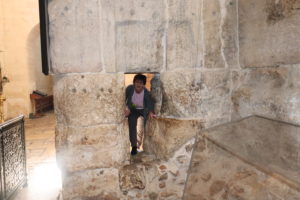
by Jim Brummett | Mar 30, 2020 | Devotions
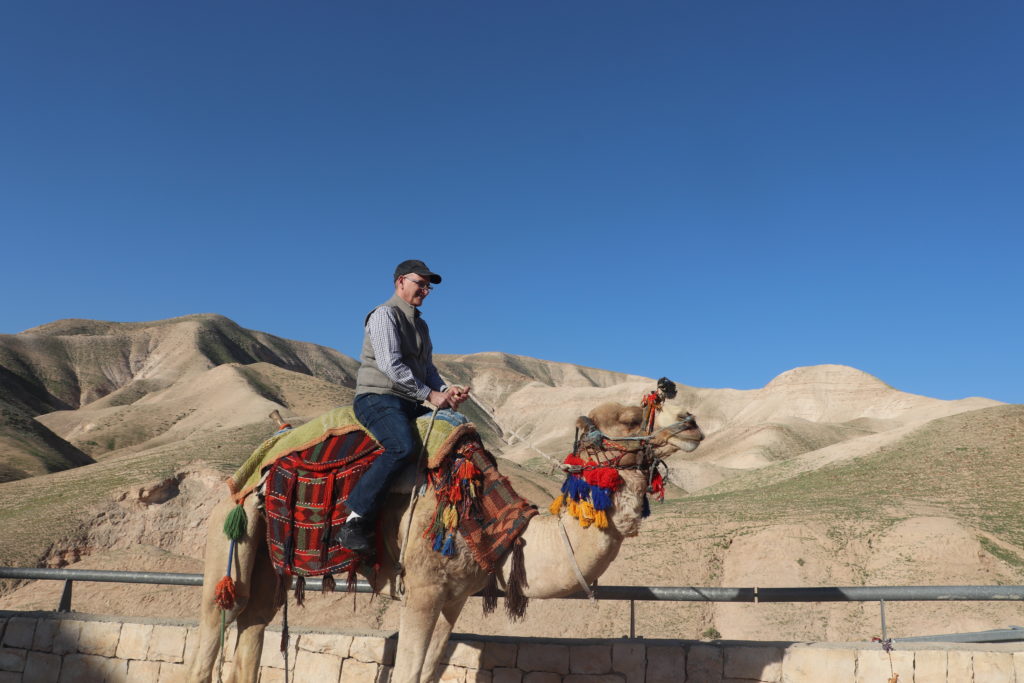 On our second full day in Israel we travelled south from Jerusalem to Masada. Along the way we met a Bedouin young man named Achmed and rode his camel named Sushi. Yes, I have pictures. Over the years I have ridden a donkey (thank you Paul Scholtz), a cow (don’t ask), a hog (two wheel version) a horse, a high-horse, and now – a camel.
On our second full day in Israel we travelled south from Jerusalem to Masada. Along the way we met a Bedouin young man named Achmed and rode his camel named Sushi. Yes, I have pictures. Over the years I have ridden a donkey (thank you Paul Scholtz), a cow (don’t ask), a hog (two wheel version) a horse, a high-horse, and now – a camel.
A short drive later we arrived at Masada, an ancient fortress situated on top of a large plateau a couple of miles west of the Dead Sea. Its cliffs rise 1,300 feet on the east and 300 feet on the west, making it an ideal refuge from danger. Herod the Great built two palaces there which he used as winter retreats. The fortress contained barracks for an army and cisterns to collect rain water. They grew pigeons for their meat and had a system in place where they could have grain for their food. It was developed to be a self-contained home effectively shut off from the rest of the world.
Historian Josephus wrote that when the Roman troops invaded Jerusalem around A.D. 70, hundreds of Jewish people fled to Masada. As we stood atop Masada, I could see why the Jewish people thought they were safe from threat. From that vantage point you could see the Dead Sea to the east, the plains and hills for many miles giving you early warning of danger. The Roman army continued its march south and encircled the plateau. The Romans were relentless and spent months building a 400 foot ramp from the desert floor to the western wall of the fortress. When the Romans breached the wall they discovered that 960 men, women and children had committed suicide so as to avoid being captured. Only two women and five children were found alive.
Pardon the over-simplification of my thoughts this morning, but I see a parallel with the story of Masada and what is happening in our world today. Just a few weeks ago our economy was soaring, and we had little worries. Now millions of people are out of work, hundreds of thousands have reportedly been infected and thousands have died. Last Friday morning I preached the funeral of a 50 year old man who had been the epitome of health and success, but was struck down by this insidious virus. I stood at Stewart’s grave with the reminder of how precious life is and how quickly it can change.
I do not advocate we live in fear, but urge all to exercise wisdom and cooperate with the mandates given by civic and medical leaders. I believe we can be proactive in this season of isolating ourselves from the threat. Begin each day giving thanks to the Lord for His rich blessings, and spend time in the scripture, in worship and prayer. Be purposeful in looking out for your neighbors, which fits in with the Lord’s teaching to “love your neighbor as yourself” (Matthew 22:39). Pray scriptures like Psalm 91 over your property and family, then place your trust in Almighty God, knowing that He is with us in every season of life (see Matthew 28:20), and He promised to never leave us nor forsake us (Hebrews 13:5).
Let’s sing: “The name of the Lord is a strong tower, the righteous run into it and they are safe…”
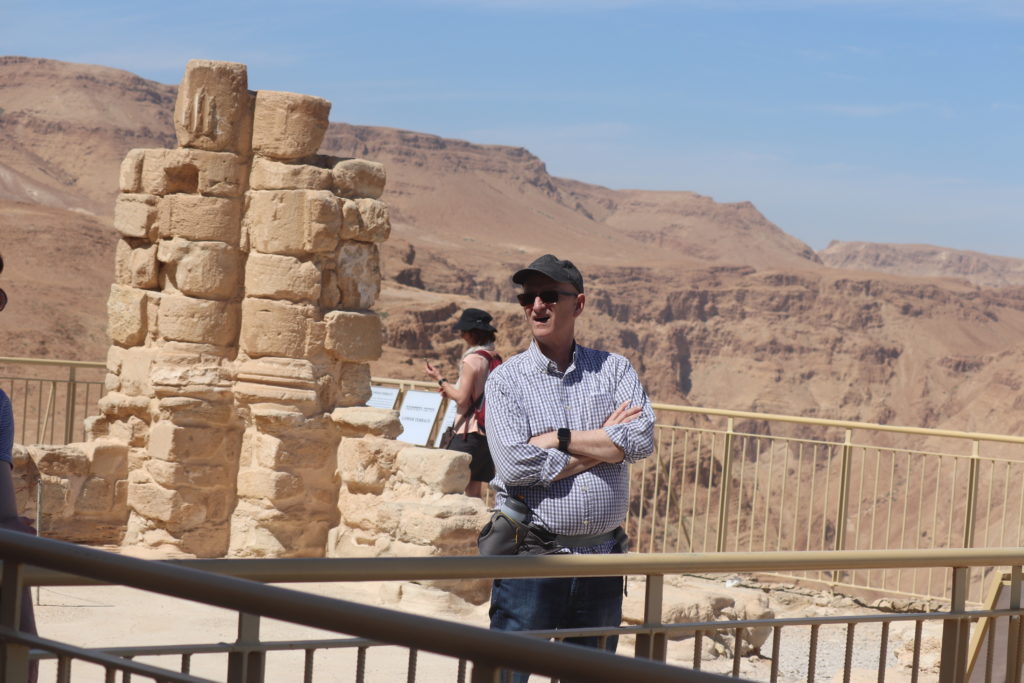
by Jim Brummett | Mar 25, 2020 | Devotions
In our recent trip to Israel, we spent our first full day in Jerusalem. One of the highlights of the day and trip was spending time in the upper room. We stood in the room for several minutes and I thought of all that had happened in that room so many years ago.
The days leading to His arrest, Jesus spent time in Jerusalem and the surrounding area. According to Matthew 26, in the hours leading up to his prayer in Gethsemane and arrest, Jesus spent the afternoon and evening privately with his disciples. It was at that time he shared what we refer to as The Lord’s Supper with his disciples, washed their feet and released Judas to carry out his plan of betrayal. It is believed by many these events took place in this upper room.
After Jesus’ resurrection, He met with His disciples several times. John 20 records one of those meetings. The scene was in a home in Jerusalem, and was likely once again the upper room. The purpose of that particular meeting was for Jesus to visit with Thomas and help him deal with his confusion and struggles related to the Lord’s death. Read John 20 again and take note of the gentle way Jesus interacted with Thomas.
A little over a month later, moments before Jesus ascended to heaven He instructed his followers to return to Jerusalem and “wait for the Promise of the Father” (Acts 1:4). Verse 13 states they returned to the upper room where they had been staying. Shortly thereafter, on the Day of Pentecost, 120 followers of Christ gathered in that large room and “all were filled with the Holy Spirit and began to speak with other tongues as the Spirit gave them utterance” (Acts 2:4).
As we stood in the upper room, I imagined all he weighty experiences that took place in that room 2,000 years ago. The Supper, washing feet, Thomas being restored from a state of confusion and discouragement, and then the outpouring of the Holy Spirit. Oh, if only those walls could talk!
Let us also consider the significant experiences in our personal life journey. During this time of quarantine, you can share communion in your home, either alone or with your family. We are restricted from meeting together, but we are not alone. We can use the phone and internet to connect with others and chat about our own experience with the Lord. We, like those 2,000 years ago, can turn a room in a home into an altar and experience the great outpouring of the Holy Spirit.
Let’s sing: “They were in an upper chamber, they were all in one accord when the Holy Ghost descended as was promised by our Lord…”
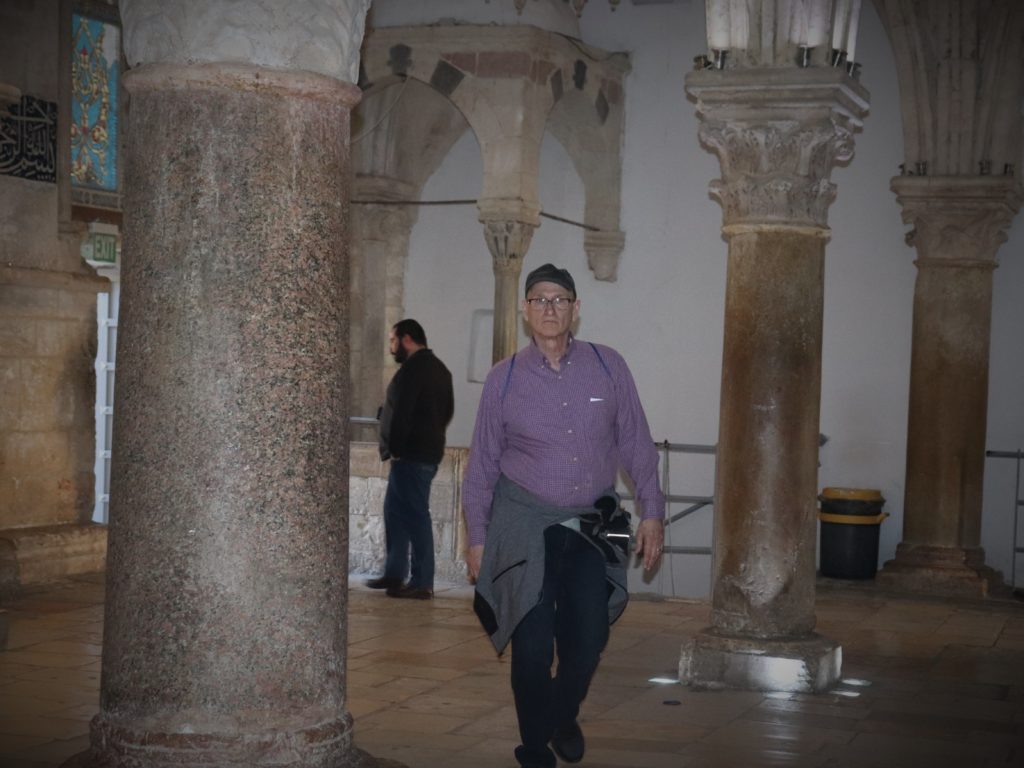
The Upper Room is in the southern part of the Old City of Jerusalem on Mount Zion and is perhaps best known as the traditional site of the Last Supper. The current structure of the room dates approximately from the fourteenth century, which accounts for the existing Gothic-era columns.
by Jim Brummett | Mar 24, 2020 | Devotions
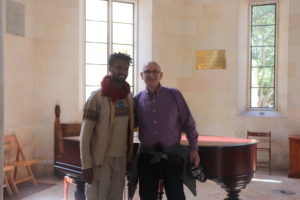
Earlier this month, Gina and I flew to Israel. To say our experience was amazing would be an understatement. We would like to share a portion of that experience with you in our morning visit over the next few days.
Day One: City of Jerusalem
Our first morning in Jerusalem, we walked into the old city of Jerusalem through the Jaffa Gate. Herod’s Royal Palace was immediately on our right. It is likely the place where Herod Antipas interrogated Jesus on the night of His trial (Luke 23). Stones at the base of the palace date back to the time of Christ. If only those stones could talk!
Directly across the street was Christ Church, founded 170 years ago and is the oldest Protestant Church in all the Middle East. As we entered the church we were struck by the beautiful architecture, the stained glass windows and stone walls. On one of the walls was the Apostle’s Creed engraved in Hebrew. We visited with one of the employees who had been a part of the congregation our cousins Scott and Laura planted a few years ago. He invited Gina and me sing. I sat at the beautiful black grand piano and we sang Amazing Grace and we wondered at all the songs and sermons that had been presented in that church through the years. (Listen to the acoustics in this beautiful sanctuary!)
“We are surrounded by a great cloud of witnesses” (Hebrews 12:1). The witnesses referenced were the multitude of first-century followers of Christ who had lived and died in faith. At the time of the writing, persecution of Christians was intensifying and many followers of Christ were considering leaving the faith and returning to Judaism. The author encouraged them to remain committed in their faith: “…let us run with endurance the race that is set before us, looking to Jesus, the author and finisher of our faith, who for the joy that was set before Him endured the cross, despising the shame, and has sat down at the right hand of the throne of God.”
As Gina and I sang in Christ Church I envisioned the many followers of Christ who worshipped as part of that congregation for the better part of two centuries. If only those walls could talk!
My friends let me courage you to remain firm in your resolve to serve and worship our Lord. Consider our Lord who ran His race, endured the cross and today is seated at the right hand of God the Father. Consider the many who have gone before us as well as the many who are watching to see how we will respond to the challenges of our day.
Let’s sing: “It will be worth it all when we see Jesus…”
by Jim Brummett | Mar 19, 2020 | Devotions
 Psalm 13:5 “I have trusted in your mercy; my heart shall rejoice in your salvation.”
Psalm 13:5 “I have trusted in your mercy; my heart shall rejoice in your salvation.”
Wouldn’t it be nice if all of life’s challenges had quick and easy solutions? In Psalm 13, David referred to a challenge that was neither quick nor easy to resolve. Prolonged problems can produce discouragement and eventually cause a man to want to throw up his hands and quit. We see a glimpse of David’s desperation in verses 3 and 4.
“Consider and hear [my prayer] and enlighten our eyes.” To enlighten our eyes is to change our focus or perspective from our problem to our God. In verse 4 he wrote “Lest my enemy say I have prevailed against him.” David didn’t want his enemy to boast of his demise.
In verses 5-6, David wrote “But I have trusted in your mercy; my heart shall rejoice in your salvation. I will sing to the LORD, because He has dealt bountifully with me.” David made the conscious decision to trust God and sing praises to him. My friends, giving verbal praise to the Lord is part of what is necessary to change our focus from our problems to our God.
Continuing in 16:7-8 we read: “I will bless the LORD who has given me counsel; my heart also instructs me in the night seasons. I have set the LORD always before me; because He is at my right hand I shall not be moved.” In the heat of the battle David made a conscious choice to bless the Lord and focus on Him rather than the problem. In 16:11 you can see David’s confidence come alive: “You will show me the path of life; in your presence is fullness of joy; at your right hand are pleasures forevermore.”
Coming to chapter 18, we read David’s testimony that God helped him walk with confidence in the face of danger. You, too, can walk with confidence when you choose to trust Almighty God and cultivate His presence through verbal expressions of praise and worship.



 On our second full day in Israel we travelled south from Jerusalem to Masada. Along the way we met a Bedouin young man named Achmed and rode his camel named Sushi. Yes, I have pictures. Over the years I have ridden a donkey (thank you Paul Scholtz), a cow (don’t ask), a hog (two wheel version) a horse, a high-horse, and now – a camel.
On our second full day in Israel we travelled south from Jerusalem to Masada. Along the way we met a Bedouin young man named Achmed and rode his camel named Sushi. Yes, I have pictures. Over the years I have ridden a donkey (thank you Paul Scholtz), a cow (don’t ask), a hog (two wheel version) a horse, a high-horse, and now – a camel.


 Psalm 13:5 “I have trusted in your mercy; my heart shall rejoice in your salvation.”
Psalm 13:5 “I have trusted in your mercy; my heart shall rejoice in your salvation.”